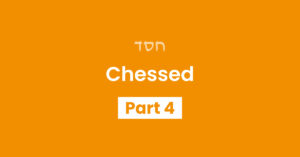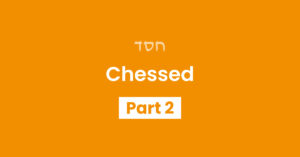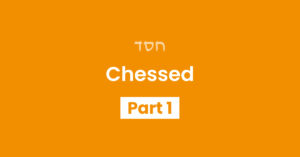So far, we have explained that chessed is not just about being a nice guy – it’s about emulating Hashem. Hashem is the ultimate Giver because He gives just for the sake of giving, without expecting to receive anything in return. By doing hidden acts of kindness, we, too, can act as true givers. Doing chessed in private ensures that the recipient of our chessed will be unaware of what we did for them, so they wont feel obligated to pay us back for our kindnesses.
Indeed, doing chessed without expecting payback is part of the Malbim’s definition of an “Ish Chessed (man of chessed).” The Malbim1 writes that a “man of chessed” is someone who regularly does chessed for all types of people – (a) without expecting payback; and (b) without being motivated by feelings of mercy or compassion.
Last week, we focused on the first part of this definition – not expecting payback for your acts of kindness. But what does the second part mean? What does it mean that a true “man of chessed” is not motivated by mercy? Aren’t mercy and compassion good things to feel?
What does it mean that a true “man of chessed” is not motivated by mercy?
Perhaps this Malbim can be understood in light of what the Torah tells us about Avraham Avinu, our role model for Chessed.
The Chessed of Avraham Avinu
Chazal teach us that each of our 3 Avos excelled in a particular middah: Avraham excelled in Chessed; Yitzchak was the master of Gevurah (restraint); and Yaakov represented Emes (truth/balance). What story does the Torah use to illustrate Avraham’s amazing chessed?
You might think the Torah would tell of some desperate person who was in dire need of something to save his life, and Avraham heroically came to the rescue. But no. Avraham’s story of chessed is nothing like that! Rather, Avraham’s primary story of chessed is about when he acted kindly toward people who didn’t even need his help!
It was the third day after Avraham’s bris milah, and he was in a lot of pain. It was scorchingly hot outside, yet Avraham was sitting outside of his tent, looking for guests to invite into his home. Hashem saw how much Avraham wanted to do the chessed of hachnosas orchim (hosting guests), so He sent 3 angels (disguised as human travelers) to pass by his tent. Avraham was so excited to see them that he ran out to greet them and served them a very fancy and delicious meal.
Of course it’s very impressive that Avraham hosted guests when he was in so much pain, yet there is something else very surprising about this story: Angels are spiritual beings who don’t need food! Why did Hashem send them to Avraham to eat a meal?
Why is this story used as the role model story for chessed, if the angels didn’t even need Avrahams help?
Rabbi Daniel Glatstein2 explains that the Torah is trying to teach us a very important lesson: Chessed is not just about helping people when they desperately need it. Chessed is not just about filling a lack. Rather, the highest level of chessed is when you yearn so much to do chessed that you actively seek out new opportunities to do chessed.
Chessed is not just about filling a lack.
The Ohr HaTzafun3 explains: Hashem wanted to test Avraham to see how much he wanted to do chessed. What did Hashem do? He made it so very hot outside that no people would dare walk around outdoors. Since no people were traveling outside, no one would need Avraham’s help. There were no ready opportunities for Avraham to do the mitzvah of hachnosas orchim; it was completely unnecessary. Avraham could have said: “Oh well… there are no travelers outside, so I’m free for today. No one needs my help.”
But what did Avraham do? He sat at the opening of his tent, waiting, yearning for the opportunity to invite guests into his home.
In this way, Avraham passed his test with flying colors. Hashem wanted to see: Does Avraham only do chessed when it’s absolutely necessary? Or does he yearn to be a giving person? By eagerly waiting outside his tent for the opportunity to do hachnosas orchim, Avraham showed that he was a true giver. As a reward for his deep desire to chessed, Hashem sent angels – who didn’t even need his help! – so as to give Avraham the opportunity to do the chessed that he so desired.
By eagerly waiting outside his tent for the opportunity to do hachnosas orchim, Avraham showed that he was a true giver.
A true giver is someone who yearns to do chessed even when it’s not needed.
Emulating Hashem
How did Avraham know to do this type of chessed? Where did he learn it from? The Ohr HaTzfun explains that Avraham learned it from Hashem.
As the Ramchal explains4, Hashem created this world in order to do chessed. Before this world existed, there were no opportunities for Hashem to give to others. Who could Hashem possibly help, if Hashem is the only One who exists in the entire universe? But Hashem wasn’t satisfied being the only Existence. Hashem yearned to do chessed – to give pleasure to others – so He created human beings to be recipients for His acts of kindness.
The entire universe – and all that is contained within – were created only in order to house mankind. The whole purpose of our existence is to be the recipients of Hashem’s chessed.
Avraham Avinu looked around the world, and through deep contemplation arrived at this conclusion: Hashem yearns to do chessed. Since it is man’s responsibility to emulate his Creator5, Avraham realized that he, too, must yearn for opportunities to give. That’s why he sat outside his tent in the scorching heat, looking for guests, even when there was no need yet for doing hachnosas orchim.
Hashem yearns to do chessed.
Being a True “Man of Chessed”
We can now understand what the Malbim meant that the ultimate “Man of Chessed” is someone who does acts of kindness that are “not motivated by feelings of mercy or compassion.”
Imagine you are walking down the street and notice a homeless man. It’s freezing cold outside and the poor man has only a flimsy blanket to cover himself with. Naturally, your heart is filled with pity for this poor person, and you might give him some food or money. Your chessed in this case was motivated by your feelings of pity.
Now imagine a different scenario: You are waiting in line at the grocery store and you see your neighbor waiting in line behind you. She has her toddler with her, and both mother and child look like they’re doing just fine.
Do you think: “She looks like she’s doing OK and doesn’t need my help. I’ll mind my own business and keep to myself”? Or do you think: “Here is an opportunity to do chessed! How can I brighten this person’s day?” If you are actively seeking out ways to do chessed, you might choose to give her a big smile, a compliment, or a kind word.
“Here is an opportunity to do chessed! How can I brighten this person’s day?”
A true “man of chessed” is someone who actively seeks out opportunities to give to others and make them happy. His chessed is motivated by a deep desire to give pleasure to other people; he doesn’t just wait for his mercy to be aroused by needy people.
This week, let’s practice keeping our eyes open for new opportunities to do chessed. Instead of waiting for someone to ask for our help, let’s try to think proactively what we can do to enhance someone else’s life or give them a small pick-me-up.
When we do chessed on this high level, we will be emulating Hashem’s chessed and will become closer to Him, thereby fulfilling the purpose of our creation.
Sources: [1] Mishlei 11:17; [2] Parashat Vayeira: The Astounding Chesed Of Avraham – Emulating Hashem; [3] Ohr HaTzafun Vol. 1 pg. 237-238; [4] Derech Hashem Vol. I. Chp. 2; [5] Devarim 28:9 and Sotah 14a
Your Challenge
Once a day, do an “extra” chessed for another person – something that’s not obviously necessary.
FOR EXAMPLE:
- Give someone a big smile when you see them.
- Leave someone a little note, cookie, candy, or something else they enjoy… just because.
- Compliment someone in front of their boss, parent, spouse, or kids.
- Send a card or flowers to someone who would appreciate it.
- Let someone else have a parking spot you were going to take.
- Let someone else go ahead of you in line.
- When you’re on the checkout line at a store, and someone has just 1 or 2 items behind you, let them go ahead of you.
- Hold the door open for someone or hold the elevator waiting.
- Say thank you to a doorman or worker.
- Give up your seat to someone else on the bus or subway.
Torah Questions
- Which one of the 4 Imahos was chosen to marry one of the Avos because of the chessed that she did? (See Bereishis 24)
- What chessed did she do?
- According to Mishlei 16:6, what will happen to someone who practices Chessed and Emes (kindness and truth)?
- The Gemara (Yevamos 79a) says that there are 3 qualities shared by all Jews. One is that we do acts of kindness. What are the other 2 qualities?
- According to Avodah Zara 5b, what benefit does a person get if he involves himself in Torah and acts of kindness?
Questions to Ponder
- The Gemara says that chessed is one of the 3 qualities shared by all Jews. Why are these 3 qualities singled out as being unique to all Jews? What about other good qualities that Jews demonstrate, like being honest or determined?
- The Midrash says that anyone who does chessed for one of the Gedolei Yisroel, it’s as if he did chessed for the entire Jewish people. Why?
- The Gemara says that the second Beis Hamikdash was destroyed due to Sinas Chinam (baseless hatred), even though the Jews at the time were involved in Torah, mitzvos, and acts of kindness. But if the Jews were doing acts of kindness, how could it be that they had Sinas Chinam? Wouldn’t you think the people who hate each other would not do chessed for each other?
- The Sefer HaIkkarim (4:17) writes that Hashem’s chessed is superior to any chessed that a human being can do, for 4 reasons. What are the 4 reasons why Hashem’s chessed is always better?




